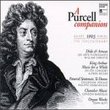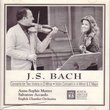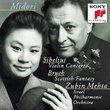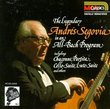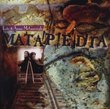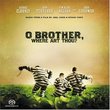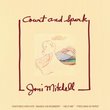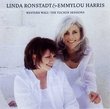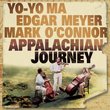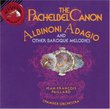| All Artists: Johann Sebastian Bach, Andrew Manze, The Academy of Ancient Music, Rachel Podger Title: Bach: Solo & Double Violin Concertos Members Wishing: 0 Total Copies: 0 Label: © 1997 Harmonia Mundi Release Date: 3/10/1997 Album Type: Import Genre: Classical Styles: Forms & Genres, Concertos, Historical Periods, Baroque (c.1600-1750), Instruments, Strings Number of Discs: 1 SwapaCD Credits: 1 Other Editions: Bach: Solo & Double Violin Concertos /Manze * Podger * AAM * Manze UPCs: 093046715526, 000008652812 |
Search - Johann Sebastian Bach, Andrew Manze, The Academy of Ancient Music :: Bach: Solo & Double Violin Concertos
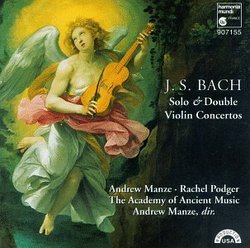 | Johann Sebastian Bach, Andrew Manze, The Academy of Ancient Music Bach: Solo & Double Violin Concertos Genre: Classical
It's well known that most of Bach's harpsichord concertos began their lives as violin concertos. Since only three violin originals survive--the ones designated as BWV 1041-43--and since these are among his greatest instr... more » |
Larger Image |
CD DetailsSynopsis
Amazon.com essential recording It's well known that most of Bach's harpsichord concertos began their lives as violin concertos. Since only three violin originals survive--the ones designated as BWV 1041-43--and since these are among his greatest instrumental works, musical scholars and performers have been reversing the process, turning the harpsichord concertos back into violin originals. BWV 1060 is one such case, a concerto for two harpsichords, which sounds much less clangy and bangy in this reconstructed version for two violins. Now Andrew Manze is simply the finest baroque violinist alive, and so this recording is self-recommending on that count alone. It's just about perfect. --David Hurwitz Similar CDs
Similarly Requested CDs
|
CD ReviewsGorgeous Music and Interpretation James Schoonmaker | Centreville, Virginia USA | 07/06/2000 (4 out of 5 stars) "I've always felt that the violin was a gorgeous, expressive instrument, and this CD gives me no reason to change my mind. Whether you like music played by period instruments or not, this CD certainly doesn't suffer for it. Both Manze and Podger are highly-regarded as period violinists; however, the focus is on the music, rather than whether the instruments are period or not. The influence of Vivaldi is clear in these pieces, especially in the alternation of tutti and solo passages, but Bach is a good deal more inventive and daring in his compositions. The interpretation of BWV 1060, the Concerto for Two Violins in D Minor, was an excellent choice and interpretation; using two violins, rather than a violin and oboe, fits the mood of the CD better, and the individual voices of the violins is spectacular. As a side note, the liner notes are good, including a short essay by Manze on the pieces and interpretation, as well as short biographies of Manze, Podger, and the Academy of Ancient Music. Personally, I think this is one of the better Bach interpretations out there." Performances which made me listen to the works again TimPride | Winchester, England | 11/03/1999 (4 out of 5 stars) "There are not many who have not heard one or all of these concertos previously, particularly the Double Concerto. Having heard both these soloists live and on record, however, I was easily persuaded to invest in another CD of the Bach concerti. Thankfully I was proved right, and have enjoyed these performances repeatedly. Manze brings a sense of the improvisatory to these works, which so often are treated as untouchable monuments. His feeling, which Podger matches in the Double Concerto, revitalizes the spirit of the music. This is not simply to do with speeds, but the inner phrasing, which he encourages the orchestra to follow. If there is a small criticism, it is that some of the ornamentation does not stand up to repeated hearing: but if that is all there is to comment on, then I would not stand in the way of supporting the musicality presented here." A brilliant interpretation to well known pieces Jonathan Gendler | Israel | 02/05/2000 (5 out of 5 stars) "The pieces in this album are well known. However, listening to this brilliant, authentic interpretation and performance of these familiar pieces, fills me with great joy every time I play this CD. The violin concertos, to my opinion among the best of Bach's instrumental pieces, can fit almost every mood. They are perfect for intimate listening while doing absolutely nothing else, but also as background.I've heard other interpretations to the concertos, but this is the best to my opinion. I must add that people who don't like authentic performance on period instruments might find this performance a bit thin compared to ones performed on modern instruments.The last piece on the CD (BWV 1060) was a surprise, since it is better known as an Oboe-Violin concerto, and not as a double violin concerto. The result of the change (read Manze's explanaition as to why he did it) is fabulous.If you buy the CD, take some time to read the short article Manze himself wrote about the recording and the interpretation. It's fascinating.ENJOY!"
|

 Track Listings (12) - Disc #1
Track Listings (12) - Disc #1
